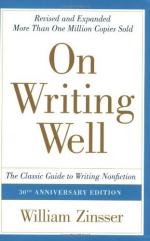
|
| Name: _________________________ | Period: ___________________ |
This test consists of 15 multiple choice questions and 5 short answer questions.
Multiple Choice Questions
1. How much information should a writer provide to his or her readers?
(a) Very little. Readers need to be left in the dark so they can go see a show on their own.
(b) Enought to make a show worth seeing, without spoiling it for the readers and viewers.
(c) Only dates and times of the show with a thumbs up or down.
(d) Everything about the show that he or she felt was worthwhile.
2. Why is jargon, or corporate speak, so prevalent in business writing?
(a) It is the industry standard.
(b) There is a lack of writing skills learned in college because all the focus is on business.
(c) People lose their ability to write when they take a job since they stop writing.
(d) It is prevalent because subordinates think that the executives want jargon-filled writing in order to sound more professional.
3. Why is it important for writers to stick to industry standards?
(a) Readers likely played the sport they are reading about and want to know what happened from a standard perspective.
(b) The industry wants everything to be the same so they can catalogue writing more easily.
(c) To be good writers, since the industry sets the standard.
(d) To sell magazines.
4. What does Zinsser think about writing memoirs?
(a) He likes memoirs and reads them constantly.
(b) He is against memoirs and thinks writers should never write about themselves.
(c) He encourages them and wants writers to stop being afraid about writing about themselves.
(d) He thinks memoirs are tacky writers.
5. What is the advantage of a writer writing his or her own memoir?
(a) The writer does not have to do any interviews.
(b) The writer does not have to pay attention to basic grammar rules.
(c) They are lax and impersonal.
(d) The main subject is already known.
6. What is a good way to edit a long story?
(a) Break it into sections to make it more manageable.
(b) Read it backwards.
(c) Take a break and read it with fresh eyes.
(d) Have someone else read it aloud.
7. Did Zinsser always want to write?
(a) Yes, ever since he was a little boy.
(b) He always wanted to write for a newspaper.
(c) No, his love of writing came after being deployed.
(d) No, it was a random interest.
8. What advice does Zinsser have for all writers?
(a) To write the best they can and defend their writing.
(b) To never give up in the face of adversity.
(c) To challenge their editors occasionally.
(d) To write as much as they can and become a content mill.
9. Why does this misconception exist?
(a) Early education lumps students into categories, creating boundaries they can never cross in the future.
(b) Scientists are left brain individuals that don't want to learn to write.
(c) Writers only want to read literature, and not science.
(d) Writing is too complex for many, and is more of an art than a science.
10. How does Zinsser create his final products?
(a) He pawns them off to his editor which sends his writing back with red squiggles.
(b) He spends hours finding the right words, best rhythms, and makes sure every sentence leads into another.
(c) He usually knows his writing is good, so he just gives everything a once over and he is done.
(d) He takes a week to read over his writing with fresh eyes.
11. What did his parents teach him that made him a fantastic writer?
(a) His mother instilled in him a love and respect for good writing, and his father taught him to have a strong work ethic.
(b) His mother was a writer and went to career day at his school.
(c) His mother taught him to spell, and his father taught him to write.
(d) HIs father took him to a field trip to a newspaper office.
12. What stops Americans from writing memoirs?
(a) An attitude to please teachers and not readers.
(b) People don't like reading memoires.
(c) Editors hate reading memoirs therefore don't pick them up.
(d) Memoires don't sell well enough.
13. What is the problem with freelance writers and editors today?
(a) Editors treat freelance writers like hired help.
(b) Writers never listen to their editors.
(c) Writers are pushovers and let their work become ruined.
(d) Editors are not as good as writers.
14. What advice does Zinsser give to employees who want to change business writing?
(a) Complain to HR.
(b) Keep trying to change it and make it better.
(c) Write the way they want regardless of what their bosses say.
(d) Take their concerns to the board.
15. Do criticism writers need to take a stance on a show?
(a) No, that should be left up to the audience.
(b) Absolutely. They have the power to make or break a show.
(c) Opinions should always be left out of writing.
(d) Yes, but they should mind their wording to not offend those in the show.
Short Answer Questions
1. What is the best way to learn to write with humor?
2. What is the danger of overusing humor in writing?
3. Is there room for opinion when writing a sports article?
4. What is an example of American television shows that use humor to talk about serious issues?
5. Writers should always look for ________________.
|
This section contains 954 words (approx. 4 pages at 300 words per page) |

|




